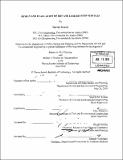| dc.contributor.advisor | Nigel H.N. Wilson and John Attanucci. | en_US |
| dc.contributor.author | Scorcia, Harvey (Harvey Manuel Scorcia Tenjo) | en_US |
| dc.contributor.other | Massachusetts Institute of Technology. Dept. of Urban Studies and Planning. | en_US |
| dc.coverage.spatial | n-us-il | en_US |
| dc.date.accessioned | 2011-01-26T14:28:40Z | |
| dc.date.available | 2011-01-26T14:28:40Z | |
| dc.date.copyright | 2010 | en_US |
| dc.date.issued | 2010 | en_US |
| dc.identifier.uri | http://hdl.handle.net/1721.1/60812 | |
| dc.description | Thesis (S.M. in Transportation)--Massachusetts Institute of Technology, Dept. of Civil and Environmental Engineering; and, (M.C.P.)--Massachusetts Institute of Technology, Dept. of Urban Studies and Planning, 2010. | en_US |
| dc.description | Cataloged from PDF version of thesis. | en_US |
| dc.description | Includes bibliographical references (p. 153-154). | en_US |
| dc.description.abstract | Many transit agencies operate limited-stop or Bus Rapid Transit (BRT) services overlapped with local services in corridors with high demand. These service strategies have the potential to improve bus performance as well as service quality. However, the implementation of these service strategies may lead to an increase in access times and waiting times for some passengers compared with an all-local service configuration. Therefore, agencies face trade-offs between reducing bus running times and reducing total passenger travel time when designing a service plan for these overlapping strategies. This thesis focuses on developing a methodology for the design and evaluation of service configurations for limited-stop (or BRT) services overlapping with local services. The developed methodology proposes evaluating limited-stop (or BRT) service configurations by six measures of effectiveness including: market share (passengers always waiting for the limited-stop service, passengers always waiting for the local service, and passengers always taking the first bus that comes), demand split, average passengers per trip, service running times, change in average passenger travel time, and change in corridor ridership. A model was developed to obtain the proposed measures of effectiveness for user-defined service configurations. This model is an improvement to that developed by Schwarcz (2004) since it allows forecasting ridership changes due to the implementation of these service configurations, assigns demand using a probabilistic choice approach, and models running time changes when BRT elements are introduced. The methodology developed to evaluate limited-stop and BRT services was applied to two CTA case studies: Chicago Avenue and 7 9th Street. Different scenarios of limited-stop and BRT services overlapped with local services were tested, examining variations in stop spacing, service frequencies, and different BRT elements such as: right-of-way segregation, enhanced boarding, and Transit Signal Priority. The results of the analysis shows the critical importance of the enforcement of preferential rights-of-way (in BRT scenarios) to achieve high corridor performance and that frequency shares (the ratio of limit-stop services buses to local buses serving the corridor in an hour) should be greater than 50% for limited-stop services and greater than or equal to 60% for BRT services. Additionally, total demand, concentration of origins and destinations, average trip length, and trip length distribution were shown to be critical to the effectiveness of limited-stop and BRT services. | en_US |
| dc.description.statementofresponsibility | by Harvey Scorcia. | en_US |
| dc.format.extent | 161 p. | en_US |
| dc.language.iso | eng | en_US |
| dc.publisher | Massachusetts Institute of Technology | en_US |
| dc.rights | M.I.T. theses are protected by
copyright. They may be viewed from this source for any purpose, but
reproduction or distribution in any format is prohibited without written
permission. See provided URL for inquiries about permission. | en_US |
| dc.rights.uri | http://dspace.mit.edu/handle/1721.1/7582 | en_US |
| dc.subject | Civil and Environmental Engineering. | en_US |
| dc.subject | Urban Studies and Planning. | en_US |
| dc.title | Design and evaluation of BRT and limited-stop services | en_US |
| dc.title.alternative | BRT and limited-stop services | en_US |
| dc.title.alternative | Design and evaluation of Bus Rapid Transit and limited-stop services | en_US |
| dc.type | Thesis | en_US |
| dc.description.degree | M.C.P. | en_US |
| dc.description.degree | S.M.in Transportation | en_US |
| dc.contributor.department | Massachusetts Institute of Technology. Department of Civil and Environmental Engineering | |
| dc.contributor.department | Massachusetts Institute of Technology. Department of Urban Studies and Planning | |
| dc.identifier.oclc | 696156440 | en_US |
